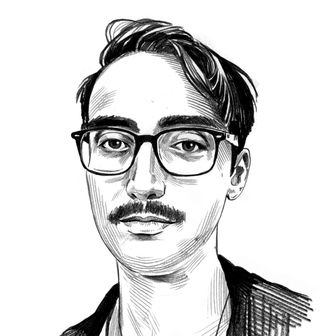
Spoilers follow for episode eight of The Last of Us, “When We Are in Need,” which premiered on HBO on March 5.
Troy Baker has lent his voice to an array of video-game franchises, appearing in acclaimed titles as varied as BioShock Infinite, Tales From the Borderlands, Uncharted 4: A Thief’s End, and Death Stranding. But no role has garnered quite the same attention as Joel Miller, the protagonist of The Last of Us, for whom Baker provided voice and motion capture. Certainly no other project has been made into a hit TV series on HBO.
With “When We Are in Need,” this week’s episode of the HBO series adapted from the video game by Craig Mazin and Neil Druckmann, Baker had the opportunity to play a guest role as James, trusty lieutenant to the leader of a cannibalistic cult. James has his private skepticism about the faith that David (Scott Shepherd) uses to subjugate and control his small group of followers. In Baker’s view, pragmatism is a guiding principle for James — a principle that leads him to go after Ellie (Bella Ramsey), who proves herself a force to be reckoned with, eventually killing James with the aid of David’s machete. But before that happens, it’s Ellie’s brilliance — and David’s disturbing interest in her — that scares him the most. In an interview with Vulture, Baker discussed James’s insecurity about his position of authority, the potential of religious faith to be weaponized, and why Pedro Pascal’s take on Joel “catches me off guard in the best way.”
How were you approached for a role in the TV series?
I never was promised a role. I was happy, on this one, to be in the stands rather than on the field. But out of the kindness of their hearts, both Neil and Craig were like, “Hey, we think we have a role for Troy that would be meaty,” pardon the pun. Neil asked, “How do you feel about playing James?” I’m like, “Oh, dude, thank you. Who’s James?” That’s what I love about this story. We have the opportunity to explore characters who may have been looked over in the game — characters who perform their function well but don’t necessarily do anything to move the story forward.
I read the script and I was like, Oh, man, there’s really something for him to do. This guy has an emotional stake in this story. So I gladfully accepted, and next thing I know, I’m freezing my ass off in Calgary as we’re getting ready to shoot the scene when we first see Ellie holding that rifle. We’re about to go picture up, and it’s cold, and we’re in this beautiful location, the wind is blowing, and there’s trees and real snow on the ground. I’ve got a rifle in my hand and a backpack, and there are cameras and a fake deer. I laugh. Scott, who plays David, was like, “What are you doing? This is not a funny scene.” I’m like, “Dude, if you could’ve gone back 12 years and told the dude that walked into an audition for a video game that he’d be standing here under these circumstances …” It’s mind boggling. I’m elated to be a part of it, and I’m excited there’s now millions of people who are joining the conversation that we’ve all been having for the last ten years.
Is there anything that surprised you about Pedro Pascal’s take on the character you originated?
Every episode, there’s some moment where I go, I didn’t think about that. I didn’t see that. It catches me off guard in the best way. That’s all I really wanted: For Pedro, or whoever is going to play this character, to just teach me something new that I didn’t realize about the character. What did I miss? Was there a blind spot that I had? Was there some element to it that we could’ve explored more?
The thing that Pedro does is he brings this vulnerability that I don’t think we could’ve done in the game because of the nature of it. In the game, you’re healing yourself from bullet wounds, so it’s really hard to be like, Oh, ow, my broken hand. In the show, we have the opportunity to exploit some of those vulnerabilities. Pedro does that in amazing ways. We also don’t have to be so locked into the camera being behind our two characters. And we can spend more time with Bill and Frank, or Tommy and Maria, or Kathleen and Perry. These characters in the game served a certain function, and now they serve a different function in our show: to be a mirror reflection of who Joel and Ellie are.
When you were working on the games, you were mainly playing off Ashley Johnson, who played Ellie. What is it like seeing that same character portrayed by Bella Ramsey, with whom you share scenes in the show?
Dude, I don’t know how to explain it. Somehow, the soul of Ellie got split and put into two humans: One went to Bella, and one went to Ashley. They are so similar in so many ways. Their mannerisms are very, very similar. Neil and Craig have said, and aptly so, that they got lucky twice. They found someone who would care about these roles as much as Ashley and I have over the last ten years, and they’ve now found two more people to care about them equally, if not more, than we did. That’s what this role requires: careful, loving hands. It’s now not just our story; it’s all of the people who have played this game and all of the people who have watched this show. The story is now theirs, and we have an obligation to those people to truthfully tell these stories.
There’s this moment when James says it might be God’s will to leave Ellie out there to die rather than bringing her back with them. Do you think he really believes that?
No, he’s just a pragmatist. David is smart — smart enough to be able to go, “Aw, shucks, I guess they just chose me!” and elevate himself to a position of tyrannical oppressor using religion and, more specifically, hope. He weaponizes that in order to assume control of people. James recognizes that within David; he knows David doesn’t believe in this. David says, “I found God after the apocalypse, which is either the best time or the worst time to find him.” No, he found the tool that hope can be for people who are desperate. James can see through that and understands, All right, if this is what we have to do to survive, then fine, I’ll go to church.
There’s this wonderful moment that I don’t think anybody will see when we’re in the dining hall and David is leading everyone in prayer. James is the only one who doesn’t pray. Ali Abbasi, our director, was like, “We need to see you pray,” and I was like, “This guy doesn’t pray. He thinks it’s all bullshit.” I’ll go along and I’ll do what I have to do — I’ll take my hat off on Sunday morning when we walk in — but I am here to do whatever it takes to protect these people and protect myself. When he says that maybe leaving Ellie is God’s will, that’s him trying to use David’s position against him. He says, “The girl is just another mouth to feed.” Those are two different arguments that are serving the same purpose, which is, She’s going to take my place, and I’ll be damned if I let that happen. So what do I gotta do to get that girl away from here? He doesn’t want to kill her. He doesn’t want to eat her. He just wants her gone.
So, in your view, it’s not so much that James wants revenge for Alec or really thinks Ellie is a threat just by being an extra mouth to feed.
All of those are just excuses. The real reason he doesn’t want Ellie is that his position right now is secure. The second that little girl comes in here, his position is in jeopardy.
Even if some part of David thinks that what he’s saying is genuine, it’s clear that a lot of his beliefs are meant to justify the awful things he does. He can square his faith with cannibalism and with these pedophilic impulses that come out later in the episode. He’s clearly using his religion as a tool.
Absolutely. There are things he says, especially about the Cordyceps: “It protects itself.” He takes something that we have clearly defined as the most horrific thing, which brought about the destruction of the world, and he goes, “Man, you gotta respect it. Isn’t it beautiful what this thing can do?” That, to me, is what makes him truly terrifying.
You mostly focus on voice acting, so this is one of relatively few live-action performances for you. What are the challenges of making that switch?
The task that is put to an actor is always the same: make someone feel something. Sometimes I’m given an amazing set on a huge multimillion-dollar production, or I’m given a microphone and a booth. But the challenge never changes. I need to make this character feel authentic and real enough for you to feel something.
It’s a commerce of trust. If they give me resources, like a huge set with wardrobe and props and locations, they’re trusting me to use those resources efficiently and respectfully. But if I’m just given a microphone, I am trusting them to use the resources at their disposal to be able to do the job the same way. For me, man, I’m a storyteller. If someone’s going to give me a job telling a story, whether as an actor in a game or on a film set or with music or directing or a podcast, I will gladly accept the challenge. Because ultimately, at the end of the day, that’s who we all are. We’re just storytellers trying to tell our story.
This interview has been edited and condensed for clarity.


